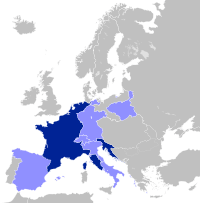Republic of Alba
| Republic of Alba | ||||||||||
| Repubblica di Alba | ||||||||||
| ||||||||||
|
| ||||||||||
| Capital | Alba | |||||||||
| Languages | Italian, French | |||||||||
| Religion | Roman Catholicism | |||||||||
| Government | Republic | |||||||||
| Historical era | French Revolutionary Wars | |||||||||
| • | Established | 26 April 1796 | ||||||||
| • | Disestablished | 28 April 1796 | ||||||||
| Currency | French franc Sardinian lira | |||||||||
| ||||||||||
| Today part of | | |||||||||
The so-called Republic of Alba (Italian: Repubblica di Alba) was a revolutionary municipality proclaimed on 26 April 1796, in Alba, northern Italy, when the town was taken by the French army.
The municipality had a very short life, because with the Armistice of Cherasco on 28 April, king Victor Amadeus III of Sardinia was given back the civil control of all Piedmont.
Lacking any effective control of its land, the municipality is remembered for two reasons, the first being the partisan Republic of Alba which took its name during World War II, the second one is its flag, designed by the jacobin Juan Antonio Ranza, who said that the blue and red were for France while the orange is taken to the tree of the Piedmont's shield. The flag existed in both horizontal and vertical tricolour versions, and it is used nowadays on some occasions by Region Piedmont.


